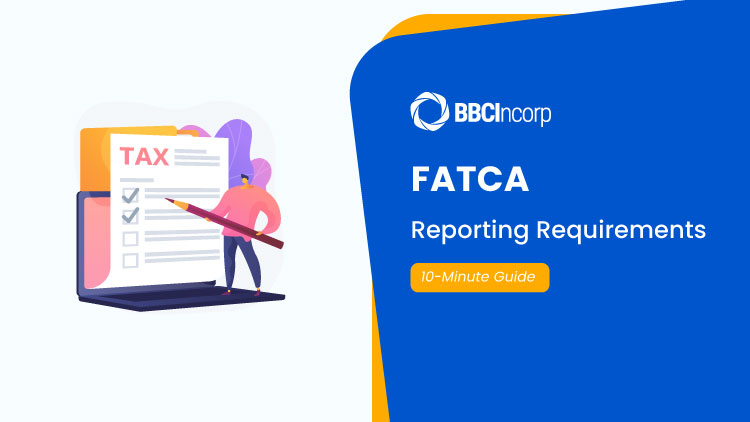
Table of Contents
What is FATCA?
The Foreign Account Tax Compliance Act (FATCA) is a US federal law established in 2010 to address tax evasion by US taxpayers who have investments in foreign financial institutions.
Under FATCA, foreign financial institutions, such as banks, investment firms, brokers, and certain insurance companies, are obligated to disclose information regarding accounts held by US taxpayers to the US Internal Revenue Service (IRS).
FATCA has two primary reporting requirements:
- US taxpayers must report their foreign financial accounts and assets to the IRS. Failure to do so can result in substantial financial penalties
- Foreign financial institutions, as well as some non-financial organizations are mandated to furnish the IRS with information about the financial accounts and foreign financial assets of US taxpayers.
What are considered foreign financial assets?
They are investment assets that are not held in a financial account maintained by financial institutions, including:
- Stock and securities issued by non-US persons;
- Interest in a foreign entity; and
- Other types of financial instruments or contracts issued by non-US persons.
If the account holders fail to provide sufficient information, the institutions are required to apply a US withholding tax of 30% on any US-sourced income paid to such account holders.
Which US taxpayers must report under the FATCA?
Not all US taxpayers are subject to FATCA reporting requirements. Only specific individuals and specified domestic entities fall under this category.
Specified Individuals
You are considered a specified individual if you meet any of the following criteria:
- You are a U.S. citizen.
- You are a resident alien of the U.S. during any part of a tax year. This means you are not a local alien and satisfy either the green card test or the substantial presence test;
- You are a non-resident alien who chooses to be treated as a resident alien for tax purposes.
- You are a non-resident alien who is a bona fide resident of American Samoa or Puerto Rico.
Specified Domestic Entities
If your entity is incorporated in the US, it will be subject to FATCA reporting if it falls into one of the following categories:
- It is a closely held domestic corporation or partnership, and at least 50% of its gross income comes from passive sources.
- It is a closely held domestic corporation or partnership, and at least 50% of its assets are used for generating passive income.
- It is a trust that has at least one specified individual or entity as a current beneficiary.
A corporation is considered closely held when a specified individual directly, indirectly, or constructively owns at least 80% of the total voting power or 80% of the total stock value of the corporation on the last day of the corporate tax year.
A partnership is considered closely held when a specified individual directly, indirectly, or constructively owns at least 80% of the capital or profits interest in the partnership on the last day of the partnership’s tax year.
If you fall into one of these categories, please proceed to the next section to learn about your reporting requirements and how to fulfill them.
What are FATCA reporting requirements for US taxpayers?
If you are a US taxpayer subject to FATCA reporting requirements and you hold financial accounts and assets in foreign countries, you must report these assets to the IRS when their total value surpasses threshold amounts.
What is the threshold amount?
Specified Individuals
For individuals classified as “Specified Individuals,” the threshold depends on your residency status, marital status, and how you file your tax returns.
Specifically, if you are living in the US and unmarried (or married but file tax returns separately), you will need to report for FATCA if the total value of your foreign accounts and assets when their total value exceeds:
- $50,000 on the last day of the tax year in question; or
- $75,000 at any point during the year.
In case you are living outside the US and unmarried (or married but file tax returns separately), you will need to report for FATCA if the total value is more than:
- $200,000 on the last day of the tax year in question; or
- $300,000 at any point during the year.
If you are married and file joint tax returns, the threshold will be doubled.
Specified Domestic Entities
If you own a specified domestic entity, it must comply with the FATCA filing requirement when its total value of foreign accounts and assets reaches:
- $50,000 on the last day of the tax year in question; or
- $75,000 at any point during the year.
How to report your FATCA?
To report your foreign financial accounts and assets, individuals and entities will use IRS Form 8938, which is titled “Statement of Specified Foreign Financial Assets”.
It’s mandatory to file your FATCA report along with your annual tax return, typically due by the IRS filing deadline, which is usually April 15th. The IRS does not accept you submitting such form separately from the tax return.
Keep in mind that you must meet the threshold requirements for reporting as discussed earlier.

COMPLYMATE
Tired of sifting through endless paperwork to understand jurisdictions’ compliance requirements? Our guide can help!
Try Now

Are there any exemptions for the FATCA reporting?
There are exemptions for certain individuals and entities. Some of the common exemptions and exceptions include:
- Low-value exemption: If the total value of your foreign financial accounts and assets does not meet the threshold for reporting, you are exempt from FATCA reporting.
- Exempted financial assets: Some types of financial assets are exempt from FATCA reporting, including certain retirement accounts like IRAs (Individual Retirement Accounts) and most foreign real estate.
What are the penalties for FATCA non-compliance?
Falling to file correctly a Form 8938 may cause you an initial fine of $10,000. You then get 90 days to submit the correct form to the IRS. Subsequent failure will cost you an additional $10,000 for each period of 30 days since the end of the 90-day period. The maximum additional penalties go up to $50,000.
In case you underpay your tax by not reporting specified foreign financial assets, you will be fined 40% of the underpayment. The same goes for underpaying your tax due to fraud, the fine will be 75% of the underpayment.
Further non-compliance may result in criminal penalties.
However, if you can have reasonable cause for the failure of filing Form 8938, no penalties shall be imposed. You will need to back up such a cause with sufficient evidence. The IRS will determine whether the cause is valid according to a case-to-case basis, considering all specific factors.
What are the differences between FATCA and FBAR?
Do not confuse the FATCA filing requirements with those of FBAR; they are two distinct sets of rules.
FBAR, or the Foreign Bank And Financial Accounts Report, also mandates reporting of foreign accounts to US authorities when their total value surpasses a specified threshold.
The primary distinction between FATCA and FBAR lies in their scope. FBAR exclusively pertains to foreign financial accounts, while FATCA necessitates reporting on additional financial assets. Additionally, the threshold for FATCA is higher than that for FBAR.
Another key difference involves where you submit your reports. For FBAR, you have to file FinCEN Form 114 electronically with the office of FinCEN by April 15. Meanwhile, for FATCA, you must attach Form 8938 to your annual tax returns filed with the IRS by such return’s due date
Am I required to file both FBAR and FATCA?
If you are subject to both requirements, you will need to file for both, separately.
Certain foreign financial accounts may be reported on both forms (Form 8938 and FinCEN Form 114), but the required information on each form may be different, in most cases.
Conclusion
US taxpayers, including individuals and certain domestic entities, must comply with FATCA reporting requirements.
They have to report on their foreign financial accounts and financial assets when their total value exceeds a threshold. The threshold varies depending on certain factors (mainly residency and marital status).
To comply with FATCA filing requirements, US-specified persons must attach Form 8938 to their annual tax returns and submit them to the IRS. Non-compliance may cost up to $60,000 in fines and further result in criminal penalties.
Shall you have any concerns or problems related to filing your FATCA, don’t hesitate to get in touch with us via service@bbcincorp.com for practical support.
Disclaimer: While BBCIncorp strives to make the information on this website as timely and accurate as possible, the information itself is for reference purposes only. You should not substitute the information provided in this article for competent legal advice. Feel free to contact BBCIncorp’s customer services for advice on your specific cases.
Industry News & Insights
Get helpful tips and info from our newsletter!
Stay in the know and be empowered with our strategic how-tos, resources, and guidelines.





